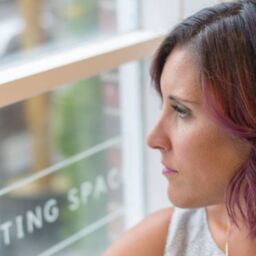
About the Podcast:
When we face unexpected challenges, it’s normal for our brains to spin out in worry and fear about potential outcomes. This mental “spin cycle” not only hinders our ability to accurately assess the probability and severity of these outcomes but also impairs our prefrontal cortex’s problem-solving ability. If you’re faced with an unexpected problem and want to stop your brain’s spin cycle, what can you do?
In this episode you’ll learn a powerful three-step strategy to halt the spin cycle. Listen in to hear how this strategy can help you calm down, identify practical solutions, and feel more confident handling the problem.
What You’ll Learn:
- How normal human brains typically respond to unexpected problems
- Why you want to slow your brain down when it wants to spin out
- A 3-step strategy you can use to stop the mental “spin cycle”
- Why accepting the worst case scenario helps your brain calm down and identify solutions
- Why facing monsters head-on is always more effective than hiding from them
- 4 examples of using the “worst case scenario” strategy
Featured in the Episode:
- Jody Moore
- FREE Confidence Cheat Sheet
- Connect with me on Instagram and Facebook
Does any of this sound familiar?
- You’re a smart, accomplished woman with advanced degrees and certifications.
- You’re detail-oriented, and you pride yourself on doing quality work.
- You have years of experience and think you should feel confident in what you do.
Despite all of that:
- You feel insecure speaking up in meetings and presenting to others.
- You hold back sharing ideas or asking questions in meetings because you’re worried what others will think of you.
- You obsess over details and worry about getting everything “just right.”
- You find yourself constantly reviewing and tweaking your work to make it a little better.
- You feel anxious and stuck when you can’t get something “just right” or when you’re not sure what “just right” is.
If that sounds like you, I want you to know you’re not alone.
If you’d like to feel more confident in your career and personal life, my FREE Confidence Cheat Sheet can help. You’ll learn 3 simple steps to start feeling more confident today.
If you’d like even more help, sign up for a FREE confidence booster call with me. We’ll meet on Zoom, and in an hour or less, I’ll identify one of YOUR confidence blockers (it’s not the same for everyone), and I’ll tell you one thing you can do to fix it. Then, if you’re interested, I’ll share information about my one-on-one coaching program. Whether you sign up or not, you’ll leave the call knowing one thing you can do to feel more confident.
Confidence doesn’t come from degrees, certifications, accolades or experience. It’s a learnable skill, and I can teach you how to have it for the rest of your life.
Schedule a free confidence booster call to get started today.
Full Episode Transcript:
Welcome to the Perfectionist Professional Woman podcast. This is Episode 16, “Calm Confidence When Things Go Wrong.”
I’m Keri Martinez. I’m a wife and mother of three children and three bonus children. I’m also a certified life coach and a member of the Church of Jesus Christ of Latter-day Saints. For a good portion of my life, I equated perfection with happiness and success. I thought that striving to be perfect and do things perfectly was the key to feeling happy and to being successful. I’ve since come to realize that perfection isn’t necessary to achieve either one of those–quite the opposite, in fact–and that has made such a difference in how I think, feel, and experience life. So if you’re a professional woman and you’d like to know how to release perfectionism so you can trade self-doubt for self-confidence, stop beating yourself up, and start enjoying your life more, then come with me. Let’s do this together.
Hello everybody. If you’re a new friend, welcome, and if you’re an old friend welcome back!
I have a small favor to ask before we get started today. If you are getting something out of these podcast episodes, please take a minute to leave a quick podcast rating and review. I would be most grateful if you do that, and I really appreciate those of you who have already done so. I’m not an algorithm expert by any means, but I do know the more ratings and reviews a podcast receives, the more it gets promoted to other podcast listeners. So, if you could pause right now and do that, I would love it! I promise I’ll be right here when you get back.
All right. In this episode, I’m going to share a powerful way you can regain a sense of calm confidence when something goes wrong in your life. This works especially well when something happens unexpectedly and you want to stop yourself panicking or spinning out about it, and it can also work well if you want to stop worrying about something more general. I’m going to share four different examples so you can see how you might apply this in different situations in your life.
All right. I want to start by telling you about two things that happened to me fairly recently. Both happened within the past few months. In both cases, something happened, I started to worry and panic and mentally spin out, I used the strategy I’m going to share, and I instantly calmed down.
Are you intrigued? Does this sound like something you want to learn? I hope so! This strategy really is amazing, and I’m excited to tell you about it!
So, first story. Several months ago, my husband and I flew up to Spokane, WA so I could attend a coaching event with one of my mentors and coaches, Jody Moore. I’ve attended other events Jody has done, and I was really excited to go to this one. This was also around the time of my birthday, and I decided to treat myself and pay for the premier upgrade for this event. The regular event was on a Saturday, but if you paid for the premier upgrade, you got to attend a small reception with Jody Friday night where you could meet her, take pictures with her, and enjoy some yummy hors d’oeuvres. I also wanted my husband to come so we could enjoy a weekend away together. He wasn’t interested in attending the coaching event, but we thought it would be fun to explore the Spokane area after the event.
So, I booked a flight for both of us that left pretty early that Friday morning and was scheduled to arrive several hours before the premier event. I wanted plenty of time to get our luggage, pick up our rental car, check into our hotel, and grab a quick bite before the event.
The morning of our flight, as we were heading to the airport, I got a text message from the airline saying our flight was delayed. It wasn’t that much of a delay, so I wasn’t worried. Shortly after that, while we were still driving to the airport, I got another text that it was going to be delayed a little more and I still wasn’t worried.
When I got a third text, I started to get worried. Our projected arrival at the layover airport was now close enough to the departure time of the connecting flight that we and our luggage might not make it onto the connecting flight.
Then our departure got pushed back a fourth time, and I knew there was no way we’d make the connecting flight.
As this realization dawned that we’d need to switch to a different connecting flight, I suddenly felt a lot more anxious. I didn’t know if there was another flight available that would get us to Spokane in time for the premier event, and I wasn’t sure how long it would take to get us switched to this different flight.
Luckily, I didn’t have to fret about that for very long because I quickly got another text message from the airline saying they’d moved us to a different connecting flight. I was relieved until I looked at our new Spokane arrival time. It was much closer to the time of the premier event and left us very little margin to get our luggage, rental car, and so on. I started to panic. I had paid a chunk more to attend the premier event, and now there was a chance I wasn’t going to make it. I envisioned all that extra money I had paid just going up in smoke. Plus, I had been looking forward to this for weeks, and there was a possibility I might miss it. All of a sudden, my amazing birthday trip seemed not so amazing, and I started to get angry with the airline. How could they do this to me? They were ruining my birthday! Everything felt so serious and awful, and there seemed no way to save my birthday that didn’t involve warping the laws of physics and/or time. My birthday was going to be ruined, my whole weekend was therefore going to be ruined, and all this money I’d spent was for nothing.
All of that spinning happened very quickly, in just a matter of seconds, but this is what human brains do. Our brains are really good at spinning out about things that either a) aren’t likely, or b) aren’t as bad as we think they’ll be. And I’m pointing that out, because if we can just slow things down a bit, we can interrupt that mental “spin cycle.”
So, when I clued into what my brain was doing, when I realized it was spinning out, I used the “worst case scenario” strategy. This strategy involves three steps: 1) identifying and accepting the worst case scenario in the situation, 2) considering the likelihood of the worst case scenario happening, and 3) identifying how you’ll respond if that happens. Doing those three things might not seem that helpful, but they are because they get your brain to slow down. They get your brain to stop spinning in imaginary uncertainty and help it focus on reality. They get your brain to focus on what’s in your control which then diminishes feelings of powerlessness and anxiety.
Before I asked myself, “What’s the worst that could happen here?” my brain was doing loop-de-loops imagining the horrors of a ruined birthday. Once I asked the question, though, I realized the worst that could happen would be I’d miss the premier event. The likelihood of that happening was about 50/50 – so possible but by no means guaranteed. There was a chance I’d arrive in time or be late, and if I was late, my husband could drop me off at the convention center and check into the hotel on his own. We could go to dinner after the premier event instead of before. If worst case happened and I had to miss the premier event, I’d be sad, but it wouldn’t be the end of the world like my brain was originally telling me it would be. I’d still get to attend Saturday. I’d still get to do other fun things with my husband. I could still relish the weekend away, enjoy exploring a city I’d never been to, and have fun on my birthday.
I also realized that worrying about our flight arriving late wasn’t going to help it get there any faster. My worry and panic wasn’t helping anything at all. It was only making things worse for me.
So, in slowing things down like that, I was able to release the worry and feel a sense of calm confidence instead.
The second story happened about a week ago. We have an extra refrigerator and upright freezer in our garage, and one night I went to get something out of that refrigerator and I noticed the power was off in the fridge and the freezer. I told my husband, and he came out to the garage to help me figure out what was wrong. We tried a variety of things and eventually ascertained the problem was the freezer. We didn’t know what the exact problem was, but we determined the outlets were fine, the refrigerator was fine, and something in the freezer was causing a power surge that kept tripping the circuit.
From the moment I first discovered the power off in the fridge, I started to worry. Then when we realized the problem was the freezer, my brain went into loop-de-loops. I started thinking about all the food we had in that freezer and how all of it would go to waste. We didn’t have enough ice chests or room in our other freezer to store it. It was nighttime so we weren’t going to be able to get someone to come out until at least the next day, possibly later. We were going to be out so much money if we lost all that food. And on and on my brain went.
This time when I caught my brain spinning out and asked myself, “What’s the worst that could happen here?” I realized the worst thing would be we lose all the food and possibly the freezer. If we did nothing, there was a 100 percent chance that would happen and we could then buy a new freezer and replace the food. It wouldn’t be ideal, we may not be able to replace everything right away, but we’d manage. We’d survive. This wasn’t the only food in the house, for example.
If I called a repair man, though, and if I was able to figure out somewhere to store at least some of the food temporarily, we wouldn’t have a total loss. We could give some of the food away. We could cook some of it. So the true likelihood of a total loss was actually 0 percent.
I also realized that worrying about how fast someone could come out wasn’t going to get a repairman to our house any faster. Worrying about the food going to waste wasn’t going to help fix the problem. And once I realized all of those things, I felt so much more calm and confident about the situation, and my husband and I were able to talk through what we wanted to do next. We were able to figure out a way to handle the food that didn’t depend on the freezer being repaired quickly, which turned out to be a really good thing because we later found out it’s going to take a month or more to get that thing fixed.
So, in both of those situations, the delayed flight and the freezer breakdown, four things happened for me when I used the worst case scenario strategy. First, I stopped my brain’s spin cycle and engaged my prefrontal cortex. Second, I made peace with the worst case scenario. Third, I identified and evaluated various options, and fourth, I felt so much better.
You might think what caused me to feel better was coming up with options and identifying the solutions. And I think that’s a small part of it, but that’s not the main thing. The biggest contributor to me feeling better was making peace with the worst case scenario, and that’s what I want you to focus on here. The power of this strategy doesn’t come from identifying a solution, although this strategy will help you do that. It comes from helping you realize you can handle the worst case scenario. That’s a subtle but incredibly important difference, especially in terms of confidence. If you make peace with and know you can handle the worst case scenario, you will feel so much more confident as you deal with the problem.
If you remember my discussion of The Model from a couple episodes back, our thoughts create our feelings. In both of those situations, my spinning thoughts about the delayed flight and the possible lost food are what caused my worry and panic, not the delayed flight and broken freezer themselves. Delayed flights and broken freezers don’t have the power to make us feel anything…thank goodness! Those things were both neutral circumstances – they weren’t good or bad until I had thoughts about them. Remember Shakespeare’s quote in Hamlet that says, “There is nothing is either good or bad, but thinking makes it so.” So those two things happened and then my brain had thoughts about them. My thoughts caused me to feel worried and panicked, not the circumstances that happened.
When I came up with the freezer food solution, I had the thought, “I now know how to fix this,” and that did help me feel calm. But as I said, what really helped was my thoughts about my capacity to handle the worst case scenario. Consider this. If someone had just given me the same solution, I might have accepted it and had the same thought, “I now know how to fix this,” and I would have felt calm. But say another problem popped up that again put the food in jeopardy. If I had focused only on the solution and therefore tied my peace of mind to that solution, I would have gone right back to spinning thoughts the moment that solution evaporated. By making peace with the worst case scenario – if the worst case thing happened it wouldn’t be ideal but we’d survive – I tied my peace of mind to something much bigger and therefore increased my capacity to feel calm and confident. So I hope you can see how that works.
OK. My third example of applying the worst case scenario strategy is for a more general situation. It’s not for one specific event. During the lockdown period of COVID when school was all online, one of my kids really started struggling academically. This child that had never failed a class before was suddenly failing almost all of them. My husband and I encouraged and reminded and yelled and bribed and punished, but nothing seemed to help. As the weeks went on, my anxiety for this child and their future escalated. I had all kinds of thoughts about how they weren’t going to graduate so they wouldn’t be able to get a decent job and their life would be forever ruined. You know, little stuff like that.
I talked about this with my coach a lot over the course of many months, and the coach repeatedly tried to get me to consider the worst case scenario. I was in so much resistance, though, that I didn’t even want to consider it. It’s funny – my brain was completely freaked out about this child failing and all the terrible things that would result from that, but at the same time I couldn’t bring myself to accept that their failing was a real possibility. I kept telling myself that it couldn’t happen.
Did you ever have the experience as a kid where you thought something was in your closet or under your bed? You were so afraid that a monster was there, but you never actually went to look, right? Maybe you called for one of your parents to come check it out for you, but you didn’t want to face it yourself, and you were too afraid to get out of bed to turn on the light, so you stayed huddled under your blankets, worried and afraid.
That’s how this experience with my child felt. I didn’t want to take a look at the possibility of this child’s failure, I didn’t want to turn on the light and see if it was real, so for a long time I just stayed huddled in fear and worry.
We think turning on the light and actually seeing the monster will be worse than not seeing it, so we keep the light off and stay hidden under our blankets. But it’s only through turning on the light and seeing the monster that can know how to defeat it. It’s really hard to defeat a monster you’re hiding from and closing your eyes to. Awareness is the first step of change, so if we’re going to make a change to overcome a problem, we need to first be aware of what the problem really is.
So as I said, it took many months, but I was finally able to look at and accept the possibility that this child might fail, and worst case, not graduate. It seems so counterintuitive, I know, but accepting that possible reality was what finally turned things around and helped me find relief. It might seem that accepting a bad outcome would bring sadness and despair, but honestly it didn’t. Seeing and facing the monster was much less scary than all of my hallucinations about it.
Once I accepted that my child might not graduate, I could see it wouldn’t be the end of the world, but before I had turned on that light, it very much seemed like it would be the end of the world. Don’t get me wrong, I wasn’t happy about the possibility. I thought it wouldn’t be ideal and there would probably be consequences we both wouldn’t like, but we’d figure it out. It wouldn’t be ideal, but maybe this would be just what this child needed to evolve and grow. There are certainly people who haven’t graduated and gone on to have amazing lives.
Actually, maybe this would be ideal. Maybe this would be a great opportunity for both of us to learn that failing doesn’t make someone a failure, to learn that failing is part of life and it can be a great learning experience. Also, for me to learn that worrying about this child failing was not helping prevent them from failing. It was just creating more suffering for me and keeping me stuck in fear and worry. I also got to consider that there was a chance this child would turn things around and graduate on time. It was possible they wouldn’t graduate but not definite. I didn’t know. It could just as easily turn out the other way. But no matter what, once I accepted the worst case scenario, I knew I could handle it if it happened (which by the way, it did not).
You can probably guess that that experience was challenging for me, but looking back, that experience was the thing that helped me really understand the power of the worst case scenario strategy. Going through that experience is what gave me the capability to apply that strategy in other situations, like my delayed flight and the broken freezer. And I’m telling you that so that you know when you’re trying to apply this strategy, it may not be easy, especially if you’re trying to apply it in a situation that involves something you really care about, like your or a loved one’s health, future, job, relationships, or even faith.
If you’re trying to apply this strategy and you, like me with my child’s grades, can’t get yourself to look at and accept the worst case scenario, I have a few suggestions for you. First, give yourself some grace and compassion. Don’t beat yourself up if it’s not easy to do this right away. This strategy is not intuitive or natural. It takes practice and time – often more than we think it should. That is normal. Second, try practicing the strategy with things that don’t feel so heavy and weighty to you. Put in reps with lighter weights so to speak and work your way up to heavier things. And third, work it through with a coach. The benefit of working with a coach is they can help you work through it faster. Can you figure things out on your own? Yes, I absolutely believe that! If you want to figure it out faster, though, you need to get a coach.
Even though it took me months to learn this while I was working with a coach, I know that’s less time than it would have taken trying to do it on my own. A coach can see things you can’t because they are not in the thick of things like you are. A coach can help you see things that aren’t readily apparent to you for the same reason. So if you’re really struggling with this, I highly recommend you seek out a coach, whether it’s me or someone else. If you want me to help you, you can book a call with me at kerimartinez.com/schedule.
Before I wrap up, I want to share one more example to demonstrate how this strategy can be used in a work situation. I had a client that was part of a team planning an event at work. They found out just a few days before the event that someone had dropped the ball on sending invitations to a few dignitaries, so the likelihood of those dignitaries being able to attend was now slim to none. My client was understandably freaked out about this and how it would reflect on their department, and they didn’t know how to proceed. When we talked through the worst case scenario, my client realized worst case would be that the dignitaries wouldn’t come and the client’s supervisor would be upset. My client and some other department members might receive informal or formal reprimands. None of those things were ideal or desirable, but acknowledging and making peace with them allowed my client to see they wouldn’t be the end of the world. My client and the rest of the department would survive. And there was also a chance things would turn out better than that. Acknowledging and accepting all of that freed up my client’s brain to figure out what to do next.
All right my friends, that’s it for this episode. I really hope you try this strategy for yourself. I hope you can see how facing the worst case scenario monster head on is much more effective than hiding from it. It has made a real difference in my life and I’d love for you to experience the same benefit.
Thanks for listening to this episode of the Perfectionist Professional Woman podcast. To see show notes and a transcript, head over to kerimartinez.com/ podcast. That’s k-e-r-i-m-a-r-t-i-n-e-z dot com forward slash podcast.
If you know someone who could benefit from this episode, grab the link and share it with them. Why not help me spread a little inspiration and goodness in the world?
And if you’re a career mom who’s struggling to feel confident at work and at home because you’re doubting yourself and your ability to handle all the things, you need to sign up for a confidence booster session with me. Go to kerimartinez.com/schedule and pick a day and time that works for you. We’ll meet on Zoom, so you can do it in the comfort of your own home and in your PJs if you want. In an hour or less, I will identify one of your unique confidence blockers and tell you one thing you can do to fix it. Then, if you’re interested and only if you’re interested, I’ll tell you how you can join my one-on-one coaching program. I promise this will not be a high pressure sales pitch. I hate those! We’ll chat a little more about your specific confidence goals, and I’ll let you know if I think you’d be a good fit for the program. If I don’t think you’d be a good fit, I’ll tell you because I don’t want to waste your time or mine, and I don’t want to waste your money. If you are a good fit, though, I will encourage you to join so you can experience the full life-changing benefits of the program.
So here’s a little description of the program so you can get a sense of whether or not it is for you. This program is designed especially for introverted career moms who want to feel more confident at work and at home. It’s for women who tend to walk into meetings and sit away from others to avoid attention, but who want to feel more confident interacting with people. It’s for women who want to be able to speak up in meetings or in front of large groups without being paralyzed by a fear of what others will think and without feeling like they need to turn into an extrovert. It’s for women who want to stop shaming themselves for being introverted so they can embrace and love who they are. It’s for women who want to feel less overwhelmed by career, home, and church responsibilities and more empowered to handle all of them. So if that sounds like you, sign up today for a confidence booster session with me. I do only five sessions a week, so you’ll want to book yours now before this week’s spots are gone.
Have an amazing week everybody, and I’ll talk to you soon.















